
Habits are important. They are important both to the normal human life and to the Christian life. Habits bring a sense of normality to our everyday lives. If I had to guess, you probably followed the same daily routine in getting ready for school this past year. From the time that I was in grade school all the way through high school, my morning routine in getting ready for school barely changed. It wasn’t until college that my morning routine changed, but even then, after my first semester my habit stayed pretty regular. My point being, as humans we are creatures of habit and for us to change either our situation has to change, or we have to be intentional about changing our habits.
I’m currently in a season of change, and every day I feel as though I’m lost and don’t know what to do. For the last three years, I have been working on my Master of Divinity at United Theological Seminary; however, now I am done with school for a very long time. There is no summer break that at the end of I will return to normalcy. The pattern of my life has had a definite change. My weekly and morning routine now look much different than they did just a few short weeks ago, but there is one thing that hasn’t changed, and that’s my alone time with God. My mornings consist of a prayer of thanksgiving, making coffee, diving into the Word of God, and finishing with an extended period of prayer.
The last time we talked, we began discussing what you need to bring to Lakeside for Youth this year to be spiritually fruitful. In all honesty, I was tempted to write on the necessity of coffee every day, but then I realized that’s a physical need more than a spiritual one (most days). Last time, we talked how important it was to bring a real (as in with pages, not an app) Bible to camp, which you can read here. The most important part of my morning routine is when I dive into the Word of God. I open my Bible daily with the same hope that David had in Psalm 119:18: Open my eyes so that I may contemplate wonderful things from your Word. However, while God may open my eyes to see these wonderful things in His Word, I am quick to forget them. Therefore, I write down everything while I’m studying God’s Word. So today, I want to talk about bringing a journal to church camp.
Why? I have never regretted writing something down because if I disagree with it later, I can always trash it. However, there have been many of times that I have regretted not writing down important thoughts, ideas, or lessons learned. I thought: “That is such a good thought that I’ll remember it easily.” I was greatly mistaken. Learn from my mistakes so that you don’t have to live with the same regret I do. Write down everything that you find important at camp, whether it comes from the impact speaker, interest group leader, youth leader, etc.
How? There are many different ways in which you can journal. Currently, I have four different journals, and I use every one of them. First, I have an interleaved journaling bible. Personally, I use it as my preaching Bible. I write down notes and insights that make the text become real and life changing to me, and then from those notes, I preach my sermons. My wife, Shelby, uses the same kind of Bible, but she uses her’s to draw in because she’s an artist. She remembers better when she illustrates her notes, whereas I remember better in an outline format.
Secondly, I have a journal in which I write down notes while listening to other people preach or give talks. In this journal, I write down everything that I find interesting. I write down everything I agree with, and everything I don’t agree with. Write down what Charlie Alcock (the impact speaker) says in all of his sessions. He’s saying it for a reason, and therefore it is important. Write it down so that weeks, months, and years after this year’s Lakeside Camp is over, you can go back and keep rediscovering and applying these truths to your life.
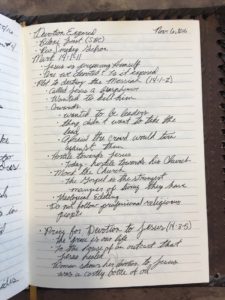
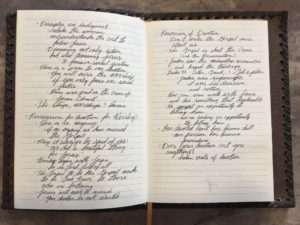
Thirdly, I have a journal in which I write down my daily devotions. I have large handwriting, and I tend to overwrite, therefore I don’s do my daily devotions in my journaling bible. Rather, I use a journal and then transfer the important information from my journal to my Bible. This helps me memorize what I have learned because I am writing it down twice. Furthermore, year after year I can go back to these journals and see where I have grown but also remember ideas I have long forgotten. In this journal, I use what is called the H.E.A.R. technique of reading and studying the Bible. It stands for: Highlight, Explain, Apply, Respond. I actually learned this technique from Mike Hurst’s pastor, Robby Gallaty in his book Foundations F260.
Lastly, I have a prayer journal. When I pray in the morning, I write down what I prayed for and the date. I do this so that I have consistency in my prayer life, but I also do it so I can record when God answered it (whether that would be a yes or a no). A prayer journal is an awesome way to see how God has been working in your life. Looking back, I can see both where God has worked in my life to get me to where I am today, but I can also see what the passions of my life were during a particular time in my life. (I won’t share a picture of this as it also contains personal information about others and not just myself.)
Now, I am not suggesting that you have to be like me and keep several different journals. (I’m actually about to start a fifth journal for a separate project.) My suggestion is that you bring something to take notes in so that you can remember what you have learned. My hope and prayer is that years down the road when Lakeside memories start to fade that you can look back to a journal and read of what you learned and experienced, and by doing so you will grow ever close to our great God and Savior, Jesus Christ.
May the Grace of the Lord Jesus Christ be with you!
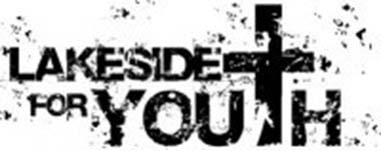
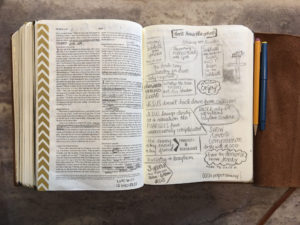
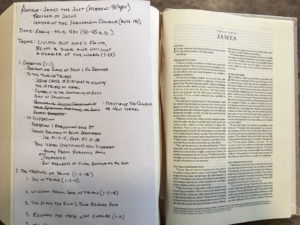
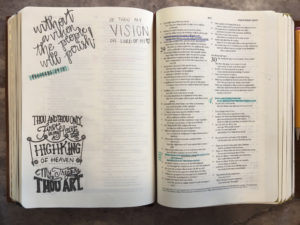
These are some great ideas! Thank you.